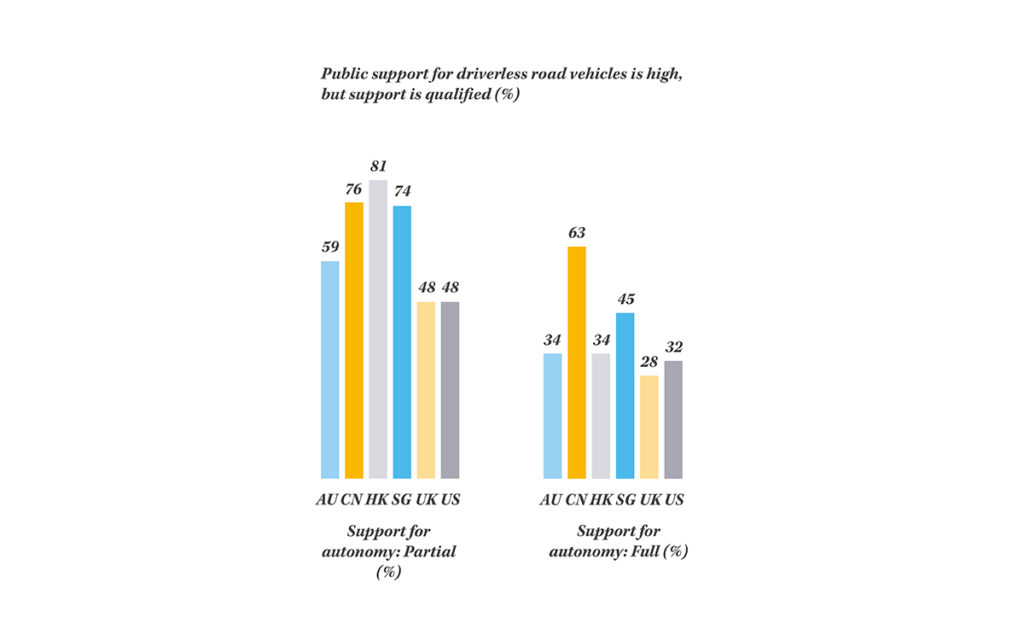British people are the least supportive nation in their attitude towards autonomous vehicles (AV), when compared with the USA, Australia, China, Singapore and Hong Kong.
A new report by international law firm Kennedys surveyed more than 6,000 individuals on the topic, as well as gaining insights from key industry leaders across the globe.
The future of transport: A brave new world? found that fewer than one-third of UK respondents (28%) supported the idea of fully autonomous vehicles compared with 75% in China and 81% in Hong Kong, the two most supporting nations. It also found that only 48% of UK respondents registered their support for partially autonomous vehicles – the joint lowest level out of all six nations.

The main reason for UK public concern is safety (67%), with respondents specifically placing trust in human judgement over computers (63%). Other reasons include fear of hackers (56%) and insurers increasing the cost of car insurance (45%) following widespread adoption.
Furthermore, the UK lags behind the rest of the world in its understanding of autonomous vehicles. Although 60% of survey respondents register a ‘high level of understanding’ of the benefits and social implications, this is comparatively low when measured against understanding in Singapore (74%) and China (68%). According to Kennedys, a lack of public understanding is a key factor in undermining public support, a point which the law firm feels UK policy makers will need to address.
The survey also showed that British people are particularly attached to driving. Of those who oppose autonomous driving, 48% said the reason behind their decision was because they “enjoyed driving and didn’t want a computer doing it for them”.
Looking to the future, only one in three (36%) of Britons agreed that by 2039 our roads will have a fully functioning AV network in place. In territories with less of a history of car ownership, agreement levels are far higher – as high as 75% in China.
Surprisingly, only 31% of UK respondents say they are comfortable with the idea of autonomous trains. This is despite widespread use of such technology since the 1960s in the form of the Victoria Line on London Underground, which opened in 1967, and the London Docklands Light Railway (DLR), introduced in 1987, as well as light rail systems such as the shuttle service between terminals at London’s Gatwick Airport, which opened in the same year. Meanwhile in China, nearly double the respondents support autonomous trains (59%).
Richard West, head of liability and innovation at Kennedys, said, “The UK public clearly has stronger reservations about the adoption of autonomous vehicles compared with the rest of the world. In China, Hong Kong and Singapore, vehicle automation is already broadly accepted and supported, while the UK public’s support is far more limited, which could act as a barrier to us harnessing the widespread benefits of this technology. The UK government has already demonstrated its appetite for broader implementation of this technology in developing a legislative framework to speed up its introduction. The obstacles to overcome are in the UK public’s perception.”
Deborah Newberry, head of corporate and public affairs at Kennedys, added, “We must also acknowledge that alongside the many possible benefits – efficiency and lower emissions, public safety and greater social inclusion – there are a range of emerging risks for businesses and end-users. In an environment where vehicles are increasingly driven by data and technology, rather than by people, there needs to be a clear call-to-action on governments across the world to create modern legal frameworks that provide appropriate protocols on the behaviors of vehicle technology.
“Those laws also need to address the storage, usage and sharing of the masses of data that will be collected by the next generation of autonomous vehicles. This will require a collaborative approach across government, motor manufacturers, software developers, insurers, law enforcement agencies and consumer groups,” she said.


